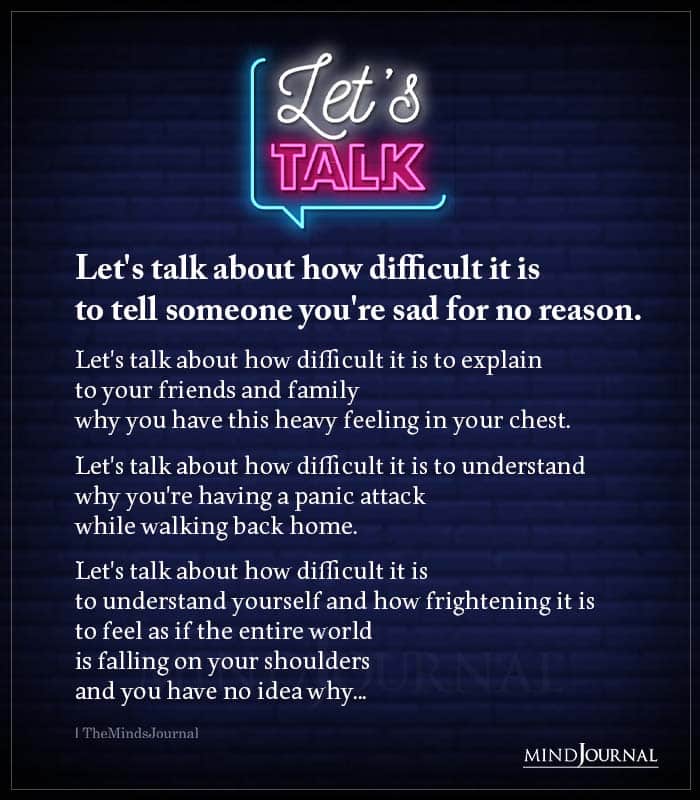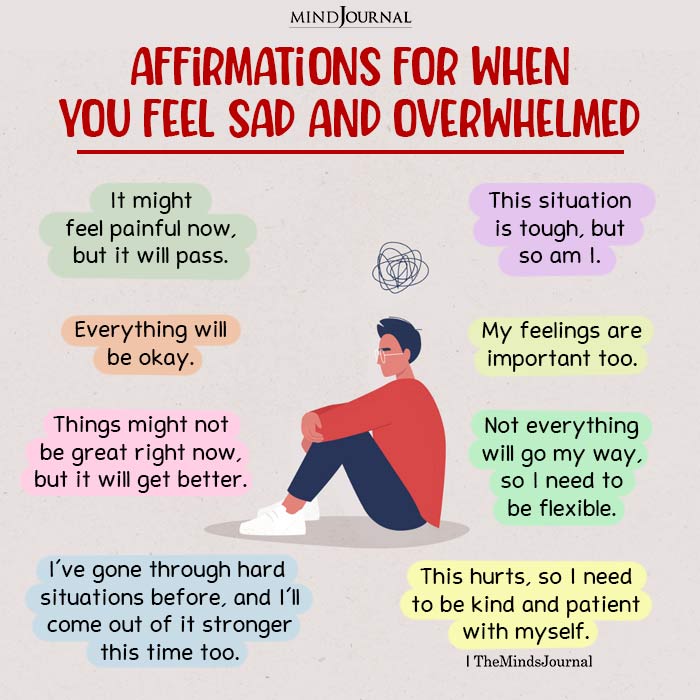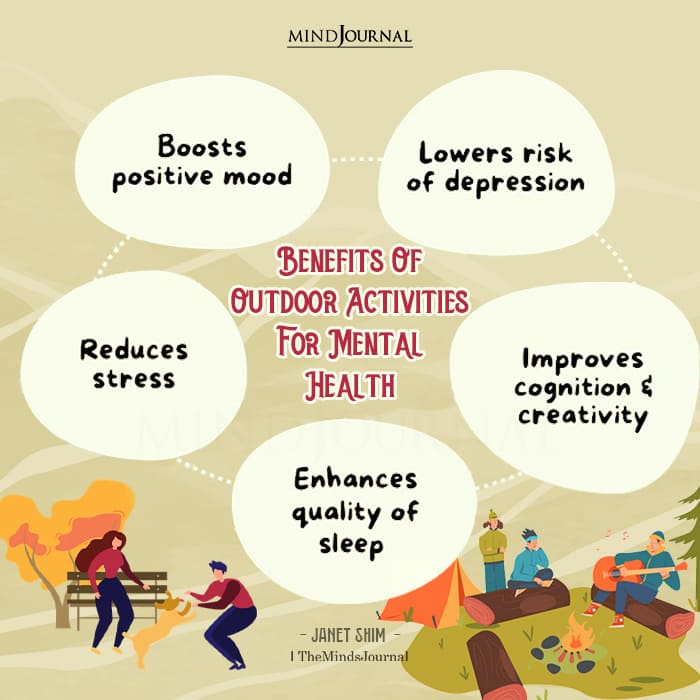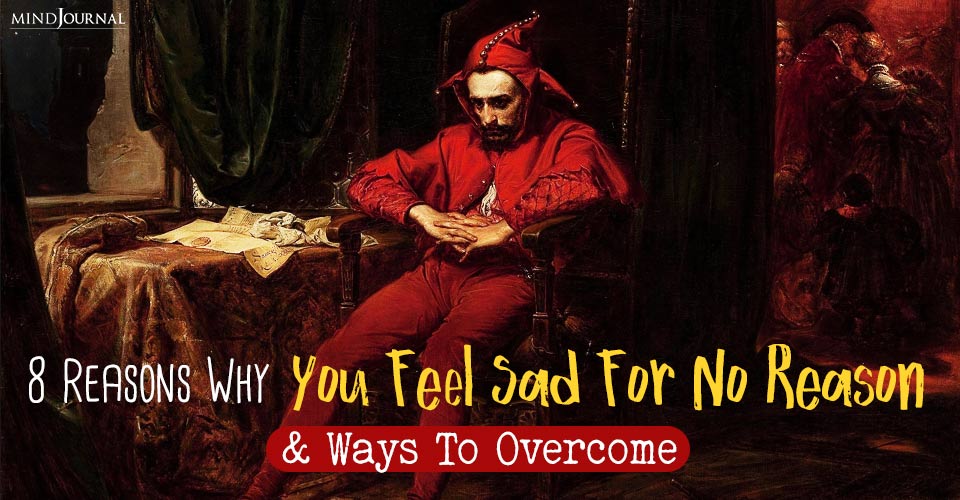Do you often ask yourself “Why do I feel sad for no reason?” While sadness is a natural human emotion, frequently feeling sad for no apparent reason can be a sign for depression. Does it mean that you have depression and not realize it? Let’s find out what this feeling is all about and is it normal to feel sad for no reason or not.
When sadness becomes your default setting
Every time you wonder – why do I feel sad for no reason – please remember It’s absolutely okay to feel sad from time to time as it is a crucial aspect of the human experience.
But when we are feeling sad for no reason, it can be confusing and overwhelming. This feeling can be described as a sense of melancholy or emptiness that seems to have no identifiable source.
While sadness can feel like a strong emotion immediately after experiencing a triggering event, with time, we learn to process and control our emotions as we move on in life.
However, when your sadness is not driven by any trigger and persists for a longer period of time, without any specific reason, then it may be a cause for concern.
If you are searching for answers to the question Why do I feel sad for no reason?, then it may be an indication of undiagnosed depression.
Intense emotions can often be caused by childhood experiences, past trauma, hormonal imbalances, life circumstances and underlying psychological conditions, such as depression.

Related: Why Do You Cry Easily: Even Without Any Reason
Feeling sad for no reason: Does it mean that you have depression?
Depression is a mental health disorder that causes persistent feelings of sadness, loss of interest, hopelessness, and worthlessness. It is typically characterized by –
- Depressed mood
- Sadness
- Emptiness
- Irritability
- Somatic and cognitive changes
- Sleep disturbance
- Interest/pleasure reduction
- Feelings or guilt or worthlessness
- Changes in energy levels or fatigue
- Concentration/attention impairment
- Appetite/weight changes
- Psychomotor disturbances
- Suicidal thoughts
If you can identify with most of these signs, then it may mean that you have depressive symptoms.
Depression can affect anyone regardless of their age, gender, education, financial status or background. Research shows that around 60% of individuals living with depression do not seek any medical support.
With depression, while you may realize that you are constantly feeling sad all the time, you may be unaware of the exact reason. You may repeatedly ask yourself –
“I feel sad for no reason. But why do I feel sad for no reason?”
“I feel depressed for no reason. But why do I feel like this all the time?”
This can lead to confusion and lead to higher levels of stress and anxiety. As you struggle with low moods, your ability to perform daily activities, whether at home or work, is negatively affected, your mental health becomes compromised and your relationships suffer.
Why do I feel sad for no reason?
Once you know this, it is easy to find out how to stop feeling sad for no reason. There may be some underlying reasons behind your sadness, you are just not aware of it. So is depression the reason why you’re feeling sad for no reason?
Depression can often be difficult to identify without proper medical diagnosis. However, depression can often manifest simply as persistent sadness which can become intense over time. However, unlike sadness, depression does not pass naturally. Rather it tends to become worse, if left untreated.
“I feel sad for no reason, is it depression?”
Maybe. But there are several other factors that we need to consider to uncover the answer to the question “Why do I feel sad for no reason?”. Let’s dive in.
1. Depression
First, it is important to recognize that sadness or feeling sad for no reason can be a symptom of depression. While depression can be triggered by a specific event, such as a breakup or a job loss, it can also occur for no apparent reason.
Studies have found that depression is often caused by –
- Abnormalities in neurotransmitters
- Genetics
- Life events
- Personality traits
- Learned helplessness due to uncontrollable events
- Cognitive distortions
- Environmental and psychosocial factors
There is no doubt that depression is one of the primary reasons for feeling sad for no reason. If you are experiencing persistent feelings of sadness, it may be worth talking to a mental health professional to see if depression may be the cause.

2. Chronic stress
Another possible reason that I feel depressed for no reason is high levels of stress. Chronic stress can result from a variety of factors, including work-related stress, financial problems, or relationship issues.
When we experience chronic stress, our bodies release a hormone called cortisol, which can have negative effects on our mood and overall well-being. Over time, chronic stress can lead to feelings of sadness, fatigue, and burnout.
3. Past trauma
Past trauma can cause sadness for no reason by triggering a range of negative emotions and thought patterns. Trauma can refer to any distressing event that overwhelms an individual’s ability to cope, such as physical or emotional abuse, neglect, or loss of a loved one. These experiences can lead to a range of symptoms, including anxiety, depression, and post-traumatic stress disorder (PTSD).
Even after the traumatic event has passed, the individual may continue to experience negative emotions and thoughts, which can contribute to feelings of sadness and emptiness. Additionally, trauma can impact an individual’s ability to form healthy relationships and build social support networks, which can also contribute to – feeling sad for no reason.
Related: What It Means When I Feel Depressed For No Reason
4. Seasonal sadness
Also known as seasonal affective disorder (SAD), seasonal sadness can cause feelings of sadness for no reason due to changes in daylight and weather patterns. SAD is a type of depression that typically occurs during the fall and winter months when there are fewer hours of daylight.
The lack of sunlight can disrupt the body’s natural circadian rhythm and affect the production of mood-regulating hormones, such as serotonin and melatonin. As a result, individuals with SAD may experience symptoms such as fatigue, loss of interest in activities, changes in appetite, and persistent feelings of sadness or hopelessness.
Living in areas with little sunlight or experiencing significant changes in weather patterns may contribute to the development of SAD. So, next time why do I feel depressed for no reason kinda thing hits you, try taking a sun bath!
5. Lack of social connections
Lack of social support can also contribute to feelings of sadness for no reason. Humans are social creatures, and we rely on social connections to feel fulfilled and happy.
If you are feeling lonely or isolated, it can lead to a sense of sadness or emptiness. This is particularly true for individuals who may have recently moved to a new city, have broken up, lost a loved one or who have experienced a significant change in their social support network.
6. Lack of purpose
Another possible explanation for why do I feel sad for no reason is a lack of purpose or meaning in life. If we do not have a sense of purpose or direction, it can lead to feelings of emptiness or sadness.
This can occur for a variety of reasons, such as feeling unfulfilled in our careers, lacking a sense of spirituality, or feeling disconnected from our passions and interests.
7. Hormonal changes
Additionally, hormonal changes can also contribute to feelings of sadness for no reason. Hormones are chemical messengers in the body that regulate a variety of bodily functions, including mood.
Changes in hormone levels, such as those that occur during puberty, pregnancy, or menopause, can lead to fluctuations in mood that may result in feelings of sadness.
8. Naturally occurring emotions
Finally, it is important to consider the possibility that feeling sad for no reason may simply be a normal part of the human experience. Emotions are complex, and sometimes we may not be able to pinpoint an exact reason for why we are feeling a certain way.
It is possible that feeling sad for no reason may simply be a temporary emotional state that will pass with time.
If you are experiencing sadness for no reason, it is important to understand that you are not alone. Many people experience this feeling, and there are several possible reasons why. Once you know why, you can move to the next step which is how to stop feeling sad for no reason
Related: 12 Simple Reasons Why You’re Unhappy
Can someone be depressed without knowing it?
Yes, it is possible for someone to be depressed without realizing it. Unfortunately, some people may not realize they have depression because the symptoms can be mild or may not seem related to mental health. And they keep on wondering why do I feel sad for no reason unable to break the cycle.
Moreover, depression can manifest in different ways and may not always be easy to recognize. In fact, some people may be reluctant to acknowledge their sadness as depression, because they don’t want to admit they have a mental health problem. They may also fail to realize that what they are feeling is not normal.

Sometimes, people may think that feeling depressed is just a part of their personality or that they will eventually “snap out of it.”
This is why it’s important to be aware of the symptoms of depression and to seek help if you are experiencing any of them.
Is depression the same as sadness?
Sadness and depression are not the same, although they are often used interchangeably.
Sadness is usually a response to a specific event, such as the loss of a loved one, a breakup, or a disappointment. It is a natural emotional response that can help individuals process and cope with difficult situations.
While sadness can be unpleasant, it is usually temporary and gradually fades as the individual adjusts to the situation.
Depression, on the other hand, is a mental health condition that is characterized by persistent feelings of sadness, hopelessness, and worthlessness.
It can affect a person’s mood, behavior, and physical health, and can last for weeks, months, or even years. Depression can interfere with a person’s ability to function at work or school, maintain relationships, and enjoy activities they once found pleasurable.
While sadness is a normal human emotion that everyone experiences from time to time, depression is a mental health disorder that can have a significant impact on a person’s daily life and requires professional treatment.
Why you may not be aware of your depression
If you keep asking “Why do I feel sad for no reason?”, then it is likely that you may not know that you are suffering from depression. While some individuals may recognize the symptoms of depression, others may not realize they are experiencing it.
Here are a few reasons why you may not know you’re depressed:
1. You think your feelings are normal
Depression can cause a range of emotional and physical symptoms, such as persistent feelings of sadness or hopelessness, changes in appetite or sleep patterns, and decreased energy or motivation.
However, if you’ve been feeling this way for a long time, you may not recognize it as a problem and think it’s just a normal part of life.
2. You’re in denial
Depression can be difficult to come to terms with, especially if you’ve never experienced it before. You may feel ashamed or embarrassed about your symptoms and try to deny that anything is wrong.
3. You’re masking your symptoms
Many individuals with depression may try to hide their symptoms by using alcohol or drugs, overeating, or engaging in other unhealthy behaviors. This can make it difficult to recognize that there’s an underlying mental health issue.
4. You’re not familiar with the symptoms of depression
Some people may not be aware of the signs of depression and may not recognize that their symptoms are related to a mental health condition. This is particularly true for individuals who may not have had access to information or resources about mental health.
Related: Suddenly Depressed: Why Your Depression Seems To Come Out Of Nowhere

5. You’re attributing your symptoms to other causes
Depression can also be mistaken for other physical or mental health conditions, such as chronic fatigue syndrome, thyroid disorders, or anxiety. If you’re not aware of the symptoms of depression, you may not realize that your symptoms are related to a mental health issue.
If you suspect that you or someone you know may be experiencing depression, it’s important to seek help from a mental health professional.
Is it normal to feel sad for no reason?
Yes, but only if such sadness is temporary and does not persist for a long time. Most of us feel sad for no specific reason from time to time and it is absolutely normal to feel this way as emotions are a complex process.
Sometimes, emotions can be difficult to understand, and it may take time to identify the underlying cause of your sadness. In some cases, the cause of your sadness may not be immediately apparent, or it may be related to past experiences or trauma that you have not fully processed or resolved.
Certain events often trigger past, suppressed memories which we may not be consciously aware of. However our subconscious thoughts may become triggered without us being aware of it, leading to feelings of sadness, emptiness and hopelessness. You may also feel sad due to daily stressors or general dissatisfaction with life or relationships.
It’s important to remember that emotions are a normal part of the human experience, and feeling sad from time to time is normal. However, such feelings should naturally go away in a short time without impairing your ability to function normally.
Is it normal to feel sad for no reason for more than two weeks? No. Then it may be a sign of an underlying mental health condition like depression.
How to stop feeling sad for no reason
Now that we have figured out the answer to your question Why do I feel sad for no reason and for how long is it normal to feel sad for no reason, let us focus on what steps you can take to stop feeling this way.
If you’re feeling sad for no reason, it can be a challenging and frustrating experience. However, there are several strategies that you can try to help you cope with these feelings and feel better:
1. Engage in self-care practices
Take good care of yourself – physically, mentally, emotionally and spiritually. Address your needs and desires. Pursue your hobbies, do things that you enjoy and make time for self-care. This can include –
- Getting a massage
- Having a spa day
- Eating healthy
- Meditating
- Reading
- Listening to music
- Practicing mindfulness
2. Connect with others
Reach out to trusted friends or family members who can provide emotional support and listen to you without judgment. Consider joining a support group or seeking out professional help from a mental health provider.
3. Challenge negative thought patterns
Negative thoughts can contribute to feelings of sadness and hopelessness. Try to challenge negative thoughts by looking for evidence that supports or contradicts them, and reframe negative thoughts in a more positive light.
4. Exercise regularly
Exercise releases endorphins, which are natural mood-boosting chemicals in the brain. Even a short walk or light exercise can help improve your mood and energy levels.
5. Spend time in nature
Spending time in nature has been shown to have a positive impact on mood and well-being. Consider taking a walk in a park or going for a hike in the woods. “There is growing evidence to suggest that exposure to natural environments can be associated with mental health benefits,” explains a study.

6. Practice gratitude
Focusing on things you are grateful for can help shift your focus away from negative thoughts and improve your mood. You can start writing a gratitude journal every night by writing about only 3 things you are thankful for each day.
7. Engage in activities you enjoy
Doing things you enjoy can help boost your mood and provide a sense of accomplishment. Consider trying a new hobby or revisiting an old one.
8. Get enough sleep
Make sure you’re getting enough sleep and taking care of your physical health. A lack of sleep or poor nutrition can contribute to feelings of sadness and fatigue.
9. Seek professional help
If your feelings of sadness persist or interfere with your daily life, it may be a sign of an underlying mental health condition. Consider seeking help from a mental health professional who can provide additional support and guidance.
These are the best tips on how to stop feeling sad for no reason.
Related: 5 Things To Do If You Feel Depressed For No Reason
Embrace sadness, but seek help
Sadness is a common human emotion that arises in response to various life events. However, if you find yourself feeling persistently sad and unable to carry out your daily activities, it may be a sign of depression.
Depression is a treatable condition, and with the right support and treatment, individuals can manage their symptoms and improve their quality of life.
Remember that it’s normal to feel sad from time to time, and it’s important to be patient and compassionate with yourself as you work to feel better.
Did you enjoy reading about why do I feel sad for no reason? Let us know in the comments.











Leave a Reply